Tyson Adams's Blog, page 58
August 14, 2016
What does the Australian term “sheila” mean?
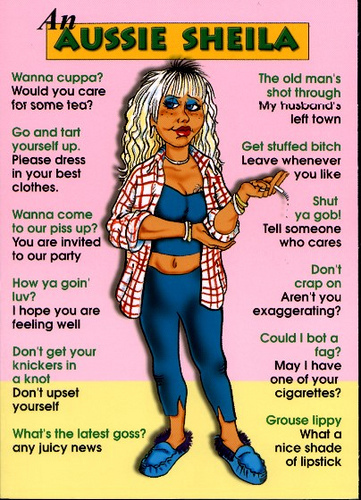
The term sheila means you have strayed far from the path of modern Australian society and have found yourself in the backwaters of the outback. In these dark hollows near stringy-bark trees and billabongs you will find yourself at risk of flamin’ Alf Stewart.
It is generally recommended that you quickly reverse the ute back up that dusty track winding back, turn at Gundagai, and head straight for the nearest inner city cafe, preferably one in Melbourne. The main thing is to pay lots of money for coffee and sit near people wearing corduroy pants or cyclists clad in lycra bodysuits. If the cafe does regular poetry readings, more the better.
Remember, once you have escaped the outback of Australia do not use any of the language you heard on your travels. Referring to a woman as a sheila, or an old person as codger, is likely to see you arrested for stoning the crows.
This post originally appeared on Quora.
Tagged: Aussie, Aussie slang, Australian, Q&A, Quora, Quora answers, Right What You No, Sheila, Tyson Adams

August 11, 2016
Book to movie: The Warriors – What’s The Difference?
Did you know that the cult classic, The Warriors, was based on a novel? How about that the novel was based on the ancient Greek tale Anabasis? Cinefix explain in this month’s What’s the Difference.
I can’t really comment much on this instalment as I’ve not seen the entire movie, nor read either the novel by Sol Yurick nor Xenophon’s tale. But it is interesting that even a cult action film about street gangs has pedigree origins. This reinforces a point I’ve often made here; that we shouldn’t be snobby about the things other people like. We might like to think that our subjective taste is better but often we don’t even appreciate how biased we are in that taste. A book/movie about a gang on the run could be one person’s retelling of a Greek tale, or it could be another person’s mindless genre piece. Or it could be both.
Tagged: Anabasis, ancient Greek tale, CineFix, Right What You No, Sol Yurick, The Warriors, Tyson Adams, What's the difference, Xenophon

6 Story Arcs

I’ve written before about plots and how there aren’t as many of them as you’d think – somewhere between 1 and 36 depending upon how you want to break them down. Recently there was some research published that analysed 1,737 fiction novels to figure out how the story arcs are constructed. Let’s pretend there is a big difference between a plot and a story arc…
The study used Project Gutenberg – i.e. public domain works – and the results suggest that there are only really six story arcs:
Fall-rise-fall: ‘Oedipus Rex’, ‘The Wonder Book of Bible Stories’, ‘A Hero of Our Time’ and ‘The Serpent River’.
Rise-fall: ‘Stories from Hans Andersen’, ‘The Rome Express’, ‘How to Read Human Nature’ and ‘The Yoga Sutras of Patanjali’.
Fall-rise: ‘The Magic of Oz’, ‘Teddy Bears’, ‘The Autobiography of St. Ignatius’ and ‘Typhoon’.
Steady fall: ‘Romeo and Juliet’, ‘The House of the Vampire’, ‘Savrola’ and ‘The Dance’.
Steady rise: ‘Alice’s Adventures Underground’, ‘Dream’, ‘The Ballad of Reading Gaol’ and ‘The Human Comedy’.
Rise-fall-rise: ‘Cinderella’, ‘A Christmas Carol’, ‘Sophist’ and ‘The Consolation of Philosophy’.
The most popular stories have been found to follow the ‘fall-rise-fall’ and ‘rise-fall’ arcs.
Or for those that prefer to read graphs because it makes them feel intellectual:
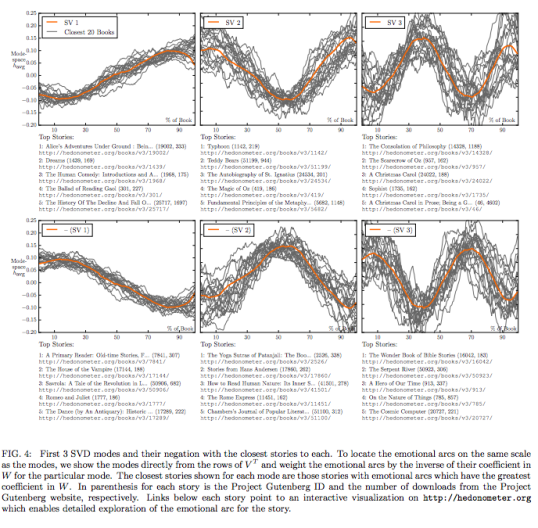
For those that just saw a bunch of squiggles in those graphs, what you are looking at is the story arc plotted over time for each story analysed. They’ve broken these into similar groups then added an average (the orange line). You can see how some of the story arcs follow the average more, whilst some types vary more. To see an individual story arc, they picked out Harry Potter as an example in the paper, but have the rest archived here (Project Gutenberg books) and here (a selection of classic and popular novels). As they note:
The entire seven book series can be classified as a “Rags to riches” and “Kill the monster” story, while the many sub plots and connections between them complicate the emotional arc of each individual book. The emotional arc shown here, captures the major highs and lows of the story, and should be familiar to any reader well acquainted with Harry Potter. Our method does not pick up emotional moments discussed briefly, perhaps in one paragraph or sentence (e.g., the first kiss of Harry and Ginny).
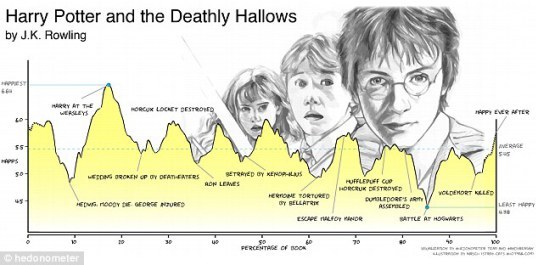
This is all nice and good, but why is this interesting? Well, aside from using my favourite statistical technique – principal components analysis – this study shows that authors create, and the audience expect, structures that are familiar. The fact that two of the story arcs (rise-fall and fall-rise-fall) are the most common emphasises this point. Our ability to communicate relies in part upon a shared emotional experience, with stories often following distinct emotional trajectories, forming patterns that are meaningful and familiar to us. There is scope to play within the formula, but ultimately we desire stories that fit conventions.
So yes, there is no original art being made.
Tagged: 6 story arcs, Plot, Plot structure, Plot vs story arc, Plotting, Project Gutenberg, Right What You No, Science, Story arcs, Story structure. Harry Potter, Tyson Adams

August 7, 2016
What one Aussie expression says the most about who Australians are and how they live their lives and why?
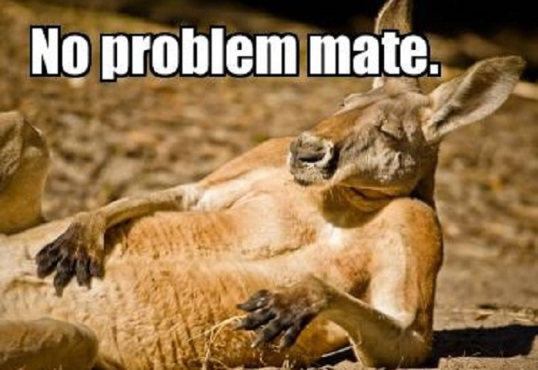
Mate.
Everyone is referred to as a mate. We may have never met, we may be worst enemies, we may be firing them for sleeping with our partner at the Xmas party, but we will refer to each other as mate.
This achieves many things:
We don’t have to remember everyone’s names (or nicknames),
We can say something incredibly insulting and have it taken as a joke,
We can use it to be more passive aggressive, which really riles people up,
We can pretend there is a level of egalitarianism about our society,
And the egalitarianism displayed allows us to utilise Tall Poppy Syndrome.
These points are underlying cultural values that Australia holds dear. We love being able to get along with people and insult our friends.
This post originally appeared on Quora.
Tagged: Aussie, Aussie slang, Australia, Australian culture, Mate, Quora, Quora answers, Right What You No, Satire, Tyson Adams

July 31, 2016
Book review: Firefight by Brandon Sanderson
 Firefight by Brandon Sanderson
Firefight by Brandon Sanderson
My rating: 4 of 5 stars
Ever wonder what Waterworld would have been like with supervillains in it? Yeah, me neither.
In the second instalment of The Reckoners, David Charleston has become Steelslayer: killer of Epics. Which means that Newcago, whilst freed from tyranny, has regular visits from Epics intent on killing Steelslayer. The Reckoners discover that the ruler of Babilar (Manhattan) has been sending these assassins, so they go to confront Regalia, an Epic from Prof’s past. Because that will end well.
Firefight is an interesting sequel to Steelheart in that the first book was about revenge, whilst this novel was about trying to understand your enemy. In fact, it even flirts with the idea that evil can’t be addressed with killing but instead requires compassion. Pretty heady stuff for a YA novel. Don’t worry, there are fights, guns, and even some swords in the story too.*
This was an enjoyable read. If anything it had more humorous similes (or is that metaphors?) that were such a welcome feature of the protagonist’s narration. I’m looking forward to finishing the series with book three: Calamity.
*Can’t sneak the moral indoctrination in without a bit of violence to hide it.
Tagged: Book review, Book reviews, Brandon Sanderson, Epics, Right What You No, Steelheart, Steelslayer, Supervillains, The Reckoners, Tyson Adams, YA books, Young Adult

July 28, 2016
Are liberals more tech-friendly than conservatives?
Tech and science acceptance isn’t really a political thing, it is more about your ideology. Ideology creates idiots out of everyone, no matter their political leanings. For example, if tech were solely the domain of, or even dominated by, liberals, then you wouldn’t have Donald Trump using his smart phone to tweet this on Twitter:
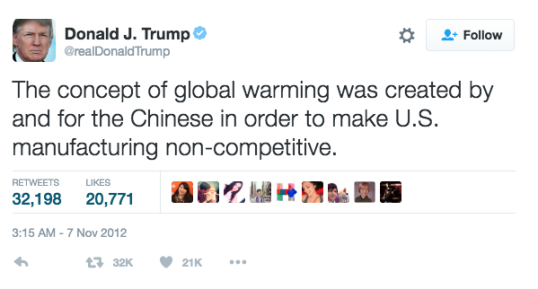
It is quite interesting that whilst disagreeing with 97% of experts on climate change Trump has managed to propose a xenophobic conspiracy whilst preaching nationalism and conservative ideology on an iPhone.* He really is a master of manipulative language. Of course, that isn’t the only brain dropping of anti-science nonsense from the Republican Presidential nominee. It is probably easier to list the science Trump and his supporters do believe** than cover all of the topics he has tweeted denial of. I will now list the science Trump has endorsed:

NB: he probably doesn’t support plant biology either.
We’d be mistaken to assume that science and technology denial or rejection are the sole domain of conservatives. On the liberal side the Greens presidential nominee, Jill Stein, has taken several anti-science stances, such as supporting not-medicine, and opposing genetic engineering (e.g. GMOs) and pesticides in agriculture. Often people like to divide science denial into conservatives denying climate change and evolution, whilst liberals deny vaccines and GMOs. But, as with most things, it isn’t quite that cut-and-dried. Take for example the topic of GMOs:

This really highlights that anti-science numpties are across the political spectrum and deny the scientific consensus for very different reasons. Some deny it because they find corporations scary (Greenpeace), some deny it because they are selling something (Joseph Mercola), some deny it because they are arrogant bloviators (Nicholas Taleb).
On the topic of climate change this spectrum also exists. We keep hearing about how liberals are all climate change supporters and how conservatives are all climate change deniers… Except that isn’t true.

You can see that there isn’t 100% agreement or disagreement from either side of US politics. You don’t even got 100% agreement from climate scientists (97% consensus), despite the overwhelming body of evidence. The Pew Research Centre has similar figures for other countries. Politics isn’t the real predictor because it is too simple. At the hard end of conservatism, the above chart suggests you would be wrong half of the time if you were to call a conservative a climate denier. Even if you call fence sitters deniers as well you are still going to be wrong over a third of the time. And that’s with all the misinformation that the conservative media pumps out (USA, Australia).
If we were to look at a proper political compass that didn’t oversimplify into left vs right, or were to take into account some other factors, then politics could be a better predictor. For example, free market ideology can be a good predictor of climate change denial (67% confidence). The ideology of the free market isn’t going to allow people to admit the market’s failure to account for the externality of carbon emissions. Similarly the ideology of anti-corporatism isn’t going to allow people to admit that companies might make life saving vaccines or develop safe biotechnology food.
The only thing political affiliation can really do is give you a general idea of why or how someone will be biased toward/away from certain technologies. It is definitely not the whole story.
A version of this post originally appeared on Quora.
*interestingly Trump may actually be anti-technology despite having embraced social media. Although, his ego probably doesn’t allow him to not use social media, so of course he has a work-around.
**not that science is about belief.
Tagged: Answers, Anthropogenic climate change, anti-GMO, climate change, Climate change denial, Donald Trump, GMO, GMOs, Jill Stein, Quora, Quora answers, Right What You No, Science, Stein science denial, Tech, Technology, Trump science denial, Tyson Adams

July 27, 2016
Idioms don’t always work
Follow Fowl Language Comics and give them money.

Broken Record: the ancient idiom
Tagged: Brian Gordon, Broken record, Cartoons, Comics, Fowl Language Comics, Idioms, Right What You No, Tyson Adams

July 24, 2016
Dirk Gently on US TV

Yeah, Harry Enfield as Dirk!
Whenever I hear about one of my favourite novels being adapted for the big screen, or the moderate screen that fits in my house, I’m wary. Not wary in a “I hope they don’t mess this up” kind or way, but wary in a “They had better not mess this up” kind of way.
I was very wary of clicking play on the video below for the new BBC America Dirk Gently series. I removed all sharp objects from my immediate vicinity before watching. If you’re a fan of Douglas Adams’ novels, you may want to do the same. Out of wariness.
Well, at least they won’t be butchering Dirk Gently, because I’m not sure that this is Dirk Gently.
This wouldn’t be the first time we’ve seen a book adaptation with the lead character portrayed by someone who doesn’t physically match the role. I’m talking about Tom Cruise playing Jack Reacher. Twice. Anyway, I’m not sure that Samuel Barnett really fits the Svlad Cjelli (aka Dirk Gently) middle-aged, overweight, poorly dressed, loser mould.
He is portrayed as a pudgy man who normally wears a heavy old light brown suit, red checked shirt with a green striped tie, long leather coat, red hat and thick metal-rimmed spectacles.#
Okay, so clearly Max Landis and team are going for more of a “youth” vibe. Maybe Barnett will gain weight and change to wearing drab clothes over the course of the series… But that doesn’t explain the car seen in the clip. Gently was famous for not having any money, since his clients never paid him, and subsequently owning a car that reflected that fact. Whilst I’m not really sure what brand/model of car that one was, it did look expensive. Does that mean Gently is now a successful conman? Did his psychic powers finally allow him to back a winning horse? Or are Americans more gullible of conmen if they have British accents?
Then we have not-MacDuff. Elijah Wood is portraying a character named Todd. He’s meant to be more of an everyman for us to relate to (see video below for discussion). So no symphony of nature, no Susan, and probably no hallway couch. I’ll let the hobbit pass. For now.
Even after watching this panel discussion I’m still wary. Landis professes to being a big fan of Douglas Adams’ writing, but this is also the same guy who talks up sequels to films nobody wanted to see. The panel discusses capturing the essence of Dirk Gently, but I’m not seeing the loser conman aspect from that trailer.
It often baffles me why screenwriters diverge so far from the source material – it feels as though I discussed this recently. Do they buy the rights but forget to buy a copy of the book for the screenwriters? In this instance that doesn’t appear to be the case. Is it just that they aren’t usually looking to do a direct adaptation but more of an “inspired by” screenplay? In which case, why buy the rights and use the character names? Landis did moan about the lack of original ideas in cinema. Are writers trying to avoid direct comparison between book and adaptation? Again, why buy the rights, since the screenwriters clearly have an idea for a movie/TV show and the source material is essentially made irrelevant?
In many instances a direct adaptation would make more sense. Beloved books would often be best served by being faithfully adapted to please fans and appeal to new fans. The source material has proved itself already: so use it! Some changes are necessary, either for run-time, or translation between mediums, but this can still be done faithfully. So why doesn’t it happen more often? I personally suspect that the screenwriters aren’t being asked to do faithful adaptations for a variety of reasons, including having bosses who don’t care about the source material.
I’m still very wary of this Dirk Gently adaptation. They had better not mess it up!
Tagged: BBC America, Book adaptation, Dirk Gently, Dirk Gently's Holistic Detective Agency, Douglas Adams, Elijah Wood, Max Landis, Right What You No, Svlad Cjelli, Tom Cruise as Jack Reacher, Tyson Adams

July 20, 2016
Would moving to Australia be good? Any opinions?
I am a economics student after i graduate I want to move to Australia. I lived 5 years in Australia (I am a citizen). I just want to know if it would be a good decision to start my life. I know it’s expensive and tax is high I just want to hear suggestions from people that are experiencing it.
Moving to Australia is a tricky decision to make. With a land mass equivalent to the USA or large parts of Europe, you really have to decide which parts of Australia are for you. Here is a helpful map:

The cost of living in Australia is often overstated. Despite widespread rumours, it is surprisingly rare that you will pay for things with your life. The Actual 10 Most Deadly Animals in Australia should help identify what to avoid.
The people who complain about our taxes are usually the same people who don’t pay them, or think they are a special snowflake. The reality is that Australia has an enviable healthcare system, social security, infrastructure that isn’t falling to pieces, and fantastic beaches (okay, you don’t pay for the last one anyway). But our internet is shithouse.
Major regional centres are often after skilled people because Aussies tend to want to live on the coast. Something to do with our love of skin cancer and white sandy beaches as far as the eye can see. The major cities also tend to be spread out more than cities elsewhere, because we love an excuse to be stuck in traffic.
We also have excellent beer in Australia. We send the rejected crap overseas for other suckers to drink.
Did anyone mention that Hugh Jackman is from Australia? Don’t worry, Russell Crowe is actually from New Zealand (except when he wins something).
Also, have you seen our ad campaigns? They might get you interested in making the trip down under.

And when all said and done, Australia is better than most other places in the world. Just look at this map!

Just make sure you can afford airconditioning.

This post originally appeared on Quora.
Tagged: Australia, climate change, Internet speed, Quora, Quora answers, Right What You No, Tyson Adams

July 17, 2016
Book to Movie: The Bourne Identity – What’s The Difference?
This month the Cinefix team are covering the differences between The Bourne Identity movie and book. So this will either be a super short episode or a super long one.
I read The Bourne Identity not long after seeing the movie. Yeah, I’m that guy. I’m frequently that guy. Anyway, I have always referred to the movie as being nothing like the book at all. Aside from a few names and the amnesia thing, there is virtually nothing similar about the two works. I have often wondered if the screenwriters got handed the book and only got as far as the blurb on the back cover before producing their screenplay. Let’s just hope Ludlum was able to cash his cheque* before he typed his last ‘The End’.**
Apparently Robert Ludlum was inspired to write a spy novel involving an amnesic because he briefly suffered from the condition himself. There’s a joke here somewhere about the screenwriters forgetting to read the novel, but I wouldn’t stoop that low. I mean, who is to say they even realised they were being asked to do an adaptation, this is Hollywood after all.
Most action fans love the Bourne movies. At a time when there was a move away from gritty and realistic action, Bourne came along and gave us a tense, gritty, and “realistic” action movie. The book is not heavy on the action and gives us a more traditional spy story about flushing out an assassin with counterintelligence and operations. Comparing the two is really quite unfair. But one area I think the book is superior is in the answer to “Who is Jason Bourne?” In the movie we see Matt Damon struggle to come to terms with not knowing and wondering what sort of man would have his skills. But we know. And he knows. The answers he finds don’t really give him any new information: yeah, you were an assassin dude. In the book the answers are more complicated and more satisfying for the hero: yay, I was bait to capture an assassin.
Without this film we would have not had Matt Damon bringing Mark Watney to the screen. Let’s celebrate by rewatching one of the best car chase scenes of all time:
*now there’s a saying that is appropriate to the time being referenced but is now as apposite and relevant as a broken record.
** Robert Ludlum died in 2001.
Tagged: Book adaptation, Book adaptations, Book to movie, Bourne Identity, CineFix, Mark Watney, Matt Damon, movies based on books, Right What You No, Robert Ludlum, Tyson Adams, What's the difference





